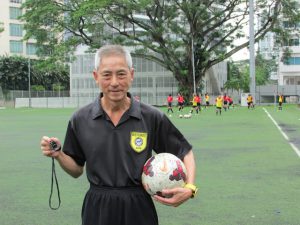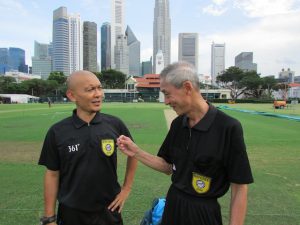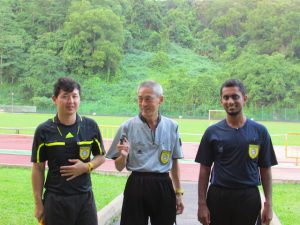Playing with no boundaries
Patrick Tay is considered the oldest referee officiating FAS-sanctioned matches but it wasn’t easy getting to where he is today.
BY: Eleanor Yap
In 1966, during Sports Day in St Joseph’s Institution, Patrick Tay recalled that when he ran the 1,500m he ended up being the last person to finish. When that happened, he made up his mind that one day, it would be a different outcome – that he would beat the winner.
Today, he is a part-time referee for the Football Association of Singapore (FAS), officiating FAS-sanctioned matches, and he is considered the oldest there. He didn’t get to where he is now without hard work – he has to pass yearly strenuous physical tests around a track, which includes running. Looking back to that fateful day of 1966, the 65-year-old father of two relishes, “I think now I can beat the winner and even run better than him! If I ran against Fandi [Ahmad], I could beat him!”
Ageless Online chats with Patrick over ice-blended juices to find out more about those physical tests and his late start into playing games:
Are your children into sports like yourself?
My children are not into sports but maybe like me, they will start late in life. I started playing sports very late, becoming active in games only in my 40s but even before, I stayed fit.
When I was working as a marine engineer, repairing ships and moving them to port, I needed to stay fit on the job. To achieve this, I would climb the stairs of the ship and thanks to carrying the big hammer, I gained some upper body strength.
Fitness continued to stay with me even after leaving the maritime industry. I did my own running in my neighbourhood two to three times a week to maintain my fitness and swam 20 laps up and down once a week. Even in my earlier days, in my 20s when I joined the Navy, I was always fit. The Navy encourages cadets to pass the fitness test so technically I was “forced” to keep fit. I was the top cadet in the Technical Officer Cadet Course as I ran every morning.
So how did all that lead to the games?
I slowly picked up badminton because my present company organised a tournament and I wanted to do well. So when my neighbours played, I just joined them. This was once a week but now, I play badminton twice a week.
What is your schedule each week?
Mondays is playing badminton, Tuesdays running 6km, Wednesdays playing football, Thursdays studying German, Fridays playing badminton, Saturdays trekking in Bukit Timah and Sundays playing futsal on hard court.
I also serve as a treasurer for my Residents’ Committee (RC) and have been for the past five years. I have been involved in grassroots for 10 years. The committee wanted me to be the chairman but I just can’t afford two hours a day to commit to meetings as sports takes up about two hours a day.
I am also still working full-time selling engines and spare parts for a German company, a company that I have worked with for 24 years. I wanted to retire but after four months, they called me back in 2012. I had plans to go back to the maritime industry when I retired and even got my certificate re-validated. (To re-validate, Patrick had to take three short courses and one correspondence course that stretched a year or even less.)
Do you regret going back to work?
I don’t regret going back to the company however, I have options available when I decide I want to go back to the maritime industry. Next year, my company may agree to employ me for another three years so likely after 69, and if I fail my referee test, I might go back and try my hand in shipping.
Let’s talk about refereeing and how you got into it.
I was playing football for fun in the weekends and didn’t know the rules. Someone suggested I take the referee course organised by FAS, which happens every year, so I took the course in 2003. When I called them, they asked me my age as at the time I was 53. They hesitated about my age and they said that I needed to pass a fitness test.
I told them I would pass it and the guy asked me to come to office. I did pass it and it was a record at the time being 53 years old to be a FAS referee. When you pass the course, they assume you want to be a referee. The course is very difficult as there are physical tests and practical assessments, and to be a referee, you need to pass them every year. The rules for other outside referees are not as stringent and they sit for shorter tests than the FAS course. The timing is stricter here and you have to do more rounds. The rules also apply to all and whether you are over 50 or younger, there is no age distinction.
Sounds tough. I am afraid to ask about the physical test. What exactly does the test encompass?
First, you need to do a 40m run in 6.2 seconds and you have to do it six times. After that, you need to run 150m in 35 seconds and walk 50m in 40 seconds on a 400m running track. No pause or interval, and you have to do eight rounds. It used to be six rounds but last year, FAS increased it.
Honestly, I don’t know how I managed to do it. It must be all my fitness training. On the spot last year, they asked me to do eight rounds. I had trained for six rounds and was shocked that I could do it! Last time when I did six rounds, it was a struggle.
How was your first time refereeing a match?
First time, I was gabra (confused/panic in Singlish) as I forgot to switch on the timer. I had to roughly gauge the timing! Good thing no one saw the panic on my face. There are a lot of things to think about when you are a referee. It wasn’t instinctive then, but now it is.
As a referee, I administer the 17 laws of the game involving everything from the jersey to substitution, and kickoff and the field, and I am also a timekeeper. There are normally three referees in a FAS game. There is no senior referee; all referees are the same. However, last year FAS started having a reserve referee. The test to apply to be that referee is easier as you are given five rounds as part of the physical test and you referee mostly secondary and primary school games.
Do you imagine refereeing in the big leagues?
I am happy to maintain this current level doing it part-time and not in bigger leagues. I don’t need to go higher as I probably won’t be able to cope with the extra number of games. I referee twice a week now – which means once a month there are eight games and I get paid S$50 per two-hour long game. When there is a game, I will take a half-day off from work.
On top of that, once a month there is mandatory training at 7am, both physical and classroom for five hours on a weekend at Jalan Besar.
Any goals in your sight this year?
My goal is to pass the next physical test, which happens every November.
What are some lessons you have learned through refereeing?
I have learned to keep healthy and to keep spiritual and mentally active. Fitness is really important to me, as I want to play football and badminton well so I need to keep fit. Another incentive is I want to pass my referee course.
What is it that you like about refereeing?
I enjoy running among the young people and challenging the older, seasoned players. The challenge is to be close to play and to make the right decisions.
It is also not just about being fit, right?
Nutrition is important. I eat very little fried food and I concentrate on getting a sufficient intake of fruits and vegetables. I do eat a bit of meat too.
How long do you think you will continue refereeing?
I think I can do it for another five years. If my body deteriorates, I could always be a reserve referee.
Wouldn’t it be interesting refereeing a team of over 60-year-old football players?
Yes, I do hope one day we can get a team of over 60-year-old football players as it would be great publicity for active agers and seniors alike. I only know of two players who are over 60 – an associate professor at Nanyang Technological University and the other, an employee at Singapore Polytechnic. However, I can see it will not be easy, as like climbing Mount Everest.
If you were given a choice of either football or going back to the maritime industry, what would you choose?
I would choose football. I like being on the ship but I got seasick all the time. I may have been on boats for 10 years but I still got sick. I would want to vomit and my bowels got irritable. I think I have built up my immune system by taking care of myself better so maybe I have overcome some of it.
One of the reasons I want to go back to the maritime industry is to see what life is like after 30 years being away and to keep my experience relevant. The other reason is age discrimination – I want to see if the industry discriminates against aged people in maritime careers. I want to challenge myself to see if I still have that engineering touch.
** According to Patrick, there is only one other person who is over 50 and a FAS referee. His name is John Doo, 55. John became a part-time referee in 2006 after he retired from his job. During that time, he has had seven years officiating at S-League games. The father of three said, “Since 2006, every year I will go for the fitness test. I showed them with my age, I still can do the test. I also showed them with discipline, determination and courage, it is possible to complete the test. Nothing is impossible.” When asked how long he will continue refereeing, Doo shared: “I will retire when my legs and body tell me to stop.”




0 Comments